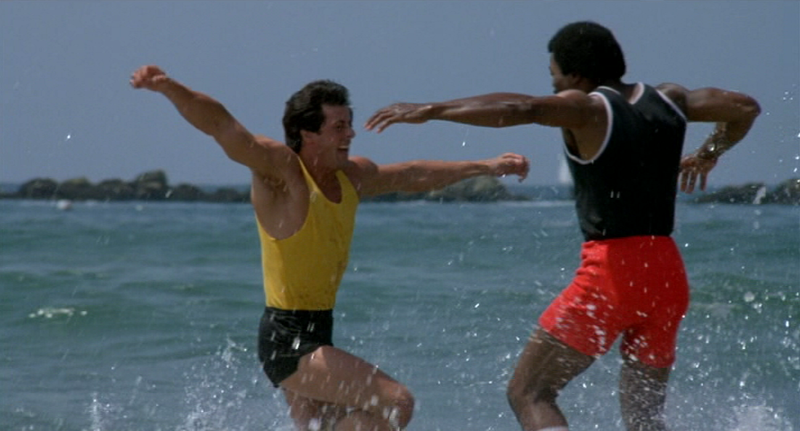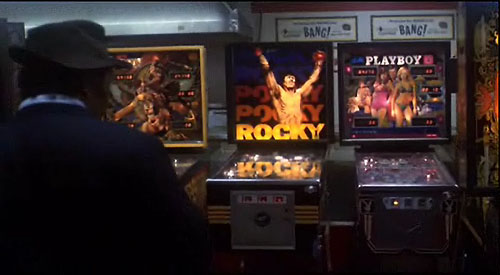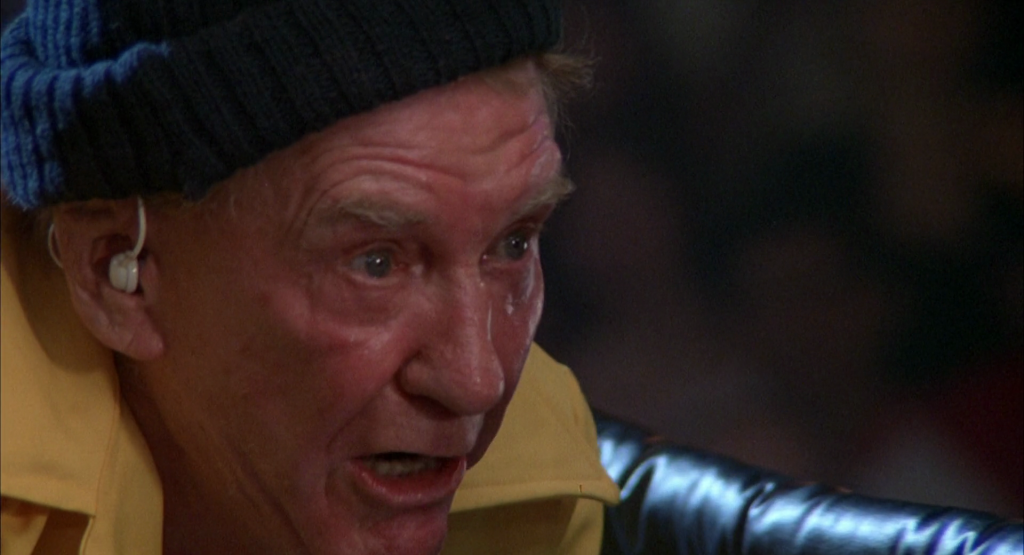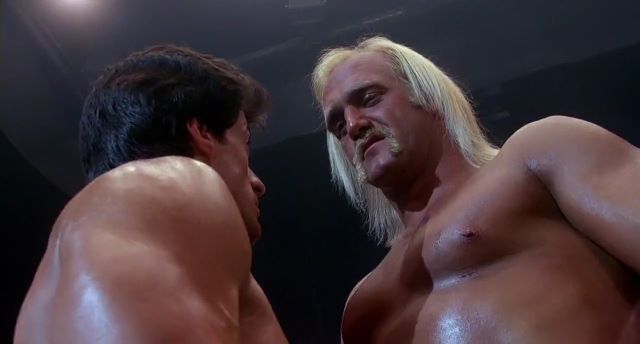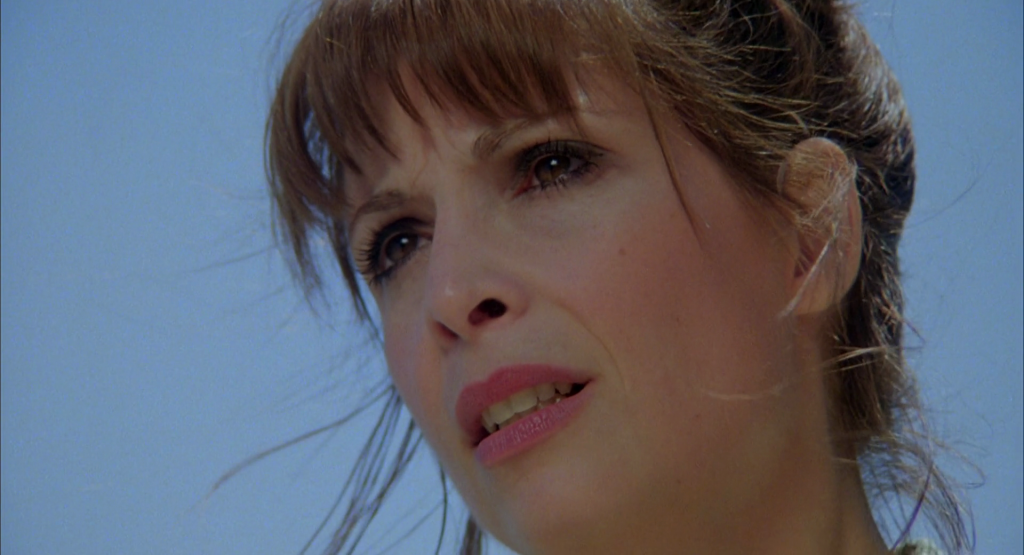For the month of January, the contenders of Deadshirt are looking at the high highs (and low lows) of Sylvester Stallone’s Rocky franchise. For each installment, Deadshirt film editor Max Robinson sits ringside with another Deadshirt staffer to discuss the film. For this installment, Max and Deadshirt Editor Emeritus Dylan Roth run on a beach in tiny shirts break down Rocky III.
Rocky III (1982)
Directed by Sylvester Stallone
Dylan: Max, I recently rewatched The Mighty Ducks for the first time since I was a kid, and while it certainly doesn’t hold up as a film, I found whole new layers in it that were beyond my perception as a child—it’s essentially a movie about class, about how the privileged compound their advantages down through the generations and how hard it is to compete with an established dynasty. Rocky III is another sports movie that I loved as a kid, and while it’s Hand-over-foot a better movie than The Mighty Ducks, I can’t say I found that much new to appreciate as an adult. It’s a pretty simple movie.
Max: Dylan….what this movie asks us to do is to put aside our preconceived notions of what a Rocky movie is. It’s LITERALLY asking us to get that Eye of the Tiger. As someone pretty lukewarm on Rocky II, I kinda love Rocky III on this first ever viewing? I think my first thought after finishing it was “80% frosting, 20% cake,” but honestly it touches on some pretty interesting and occasionally poignant ideas. Dylan, I want to start by talking about the weirdest part of this movie: Paulie destroying that Rocky pinball machine in the opening NEVER goes anywhere.
Dylan: Paulie, Rocky’s gross, racist alcoholic brother-in-law is so jealous of the Heavyweight Champ’s success that he actually challenges him to a fistfight in the parking garage of a Philadelphia police station, and Rock’s response is to offer him a job. This immediately dissolves the tension between them, but gives Paulie a reason to stick around for the rest of the movie, since he’s now part of Rocky’s training crew. What does he do, actually? What is his job title? No one knows. Paulie is such an irredeemably awful character that I wish his arc ended with him getting thrown in the drunk tank.
Max: Like, it’s an effective opener! Paulie drunk and resentful of his friend’s success, lashes out in a big way. You’d figure this about Paulie finally running out of chances with the long-suffering Rocky? Maybe he dies and Rocky’s guilt hangs over him for the remainder of the film? NAH he gets a job and antagonizes Apollo Creed.
Despite the Paulie feint, Rocky III is about Rocky becoming defeated by victory and learning, ONE PAINFUL STEP AT A TIME, the way back to the path of a fighter.
Dylan: This journey is set up very effectively by the non-Paulie parts of the opening montage, in which reigning champ Rocky defends his title against (as the audience learns later) a bunch of chumps and makes a lot of paid public appearances. He does commercials, he does The Muppet Show (reusing footage from Stallone’s own guest appearance). Meanwhile, hungry challenger Clubber Lang (introducing Mr. T.) climbs the ranks of Rocky’s division, training hard and studying the weakening Italian Stallion. Lang is cool but rude, and he’s got something to prove. Rocky may have had that…cat-like persistence…in the past, but it’s long gone now. We can see it, his trainer Mickey can see it, but he can’t. So begins this Captial-“C”-Classical tale of hubris.
Max: The first 45 minutes of this movie feels WRONG: Rocky at the statue unveiling, all the commercials, Rocky training in what is essentially a big convention hall for hundreds of adoring fans. It’s only when he gets his ass handed to him by Clubber Lang and loses Mickey to a heart attack that you realize that this is the point: Rocky’s lost himself, he’s no longer the poor lunk from a shitty apartment in Philly. With this crushing defeat and the loss of Mickey, Rocky finds himself angry and guilty in a whole new place emotionally. Dylan, I thought Rocky throwing his helmet at his own statue was some nice cheese, but Mickey’s death was legitimately really touching? It’s sort of a reveal that Mickey was Jewish and Rocky reading Hebrew at his mentor’s funeral is kind of powerful. Stallone’s a mixed bag as a director but he occasionally throws some surprising moments like this out there.
Dylan: It’s pretty remarkable that, while Mickey is one of the more cartoonish characters in the original Rocky, which was a pretty down-to-Earth film, by Rocky III he’s a sobering influence in an otherwise broad, cartoonish movie. Every scene with or about Mickey is compelling on a different level from the rest. The scene in which Mick reveals to Rocky that he’s been deliberately lining up scrubs for him to defend his title against in an effort to keep him happy and healthy is the quiet emotional core of the bombastic Rocky III. Rocky is angry that Mickey has made a paper champion out of him—he understands that he did it out of love, but it completely shreds his self-confidence, and it takes the whole film for him to win it back.
Max: As an aside, let’s talk about Hulk Hogan’s big screen debut as Thunderlips for a second. Rocky agrees to fight Thunderlips—THE SELF-DESCRIBED ULTIMATE MALE—for a charity combination boxing/wrestling match. There’s no real point to this bit of the film under than to remind the audience that Rocky is a good guy and do a bunch of weird gags? Dylan, you’re a big wrestling guy so I’m especially interested in your take on this totally insane scene.
Dylan: First of all, Hulk Hogan’s appearance in Rocky III is actually pretty important to the real-life history of wrestling—he took the role against the wishes of the then-head of the World Wrestling Federation, Vincent J. McMahon, and got fired over it, but performing in a hit motion picture made him a marquee name. So when McMahon’s evil son Vincent Kennedy McMahon purchased WWF a few years later, he immediately snatched Hogan back up and built an empire on his shoulders. The example of Rocky III’s success may very well have influenced the younger McMahon’s efforts to cross-promote the WWF with other pop cultural institutions like MTV.
But let’s get back to the film, because the Rocky/Thunderlips fight in Rocky III is absolutely insane. First of all, wrestling is real in the world of Rocky. Thunderlips beats the hell out of Rocky, throws him around the ring, suplexes him, body-slams him, and Rocky has no idea what is going on. I love the detail of the television commentators roundly predicting that any wrestler has an enormous advantage over any boxer in a fight, because if you live in a world where no one knows that wrestling is staged (and few people did in 1982), that makes a degree of sense. But what’s extra funny is that Rocky/Thunderlips is actually a pretty decent short wrestling match, with a clear story being told and both competitors coming out looking like unstoppable badasses. It’s a much better wrestling match than either Rocky/Lang fights are boxing matches.
Max: Alright, so snapping back to sad Rocky: Our hero finds potential salvation in the muscley, be-polo’ed arms of his former rival Apollo Creed. Creed’s gonna teach him what it means to be hungry so that means it’s time to pack up and head to Los Angeles to go train in Apollo’s old stomping grounds. I really like this part of the film! It’s a nice variant on the established Rocky training routines we’ve seen and it gives Apollo a new dimension both with the glimpse at his roots and his new role as Rocky’s often frustrated trainer. Why the fuck did Rocky bring Paulie??
Dylan: Was “pudgy white guy growls racist asides at black people” comic relief a big hit among audiences in 1982? I wish one of the fighters training in Apollo’s gym had chucked him out the freaking window. Apollo nearly slugs him at one point and he’s an incredibly even-tempered guy. But Apollo himself is served really well by this story—without Rocky III, there’s absolutely no Creed. This movie establishes him as not only a great boxer but a great trainer and friend, and it reinforces one of his defining characteristics from the first film, which is his business savvy. One of his motivations for helping Rocky train is to get a piece of the door for the rematch. Apollo’s relationship with Rocky is refreshing because it’s very different from the one Rock had with Mickey; he’s like an older brother, Rocky looks up to him, but his brand of encouragement is more peer-to-peer than mentor-to-mentee, and that’s what Rocky needs after the loss of a father figure that so recently broke his trust.
Max: This all climaxes in two excellent bits: Talia Shire’s normally meek Adrian yelling at Rocky to get his shit together and Rocky/Apollo triumphantly running on the beach. Rocky’s mean now, he’s hungry! Dylan, how do you feel about this final rematch?
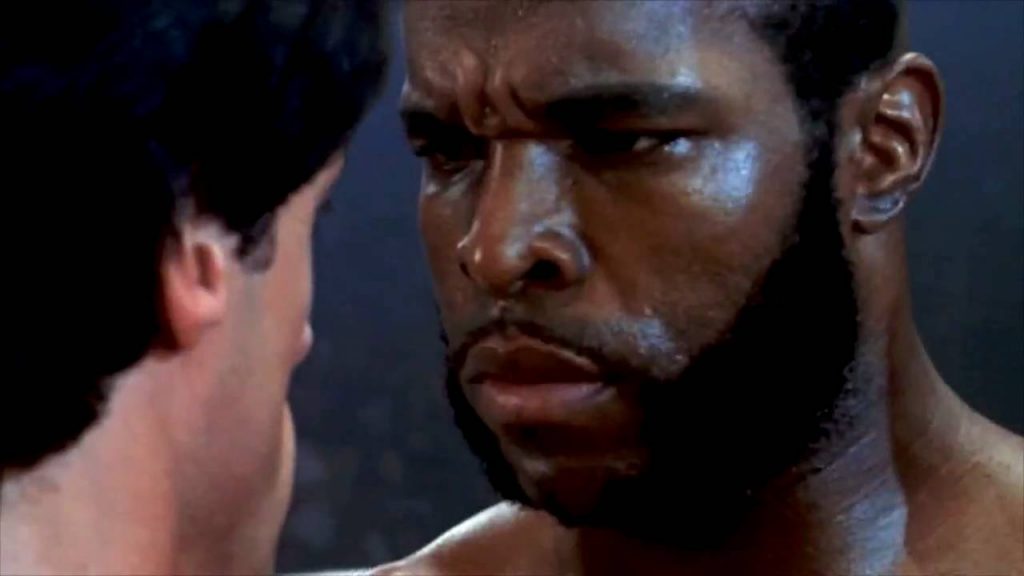
Dylan: The final fight of Rocky III is cool because Rocky is a totally different fighter now than he was in the climaxes of either predecessor, as in he has literally dropped 11 pounds. He’s technically no longer a heavyweight. Clubber Lang is unquestionably a bigger, harder-hitting fighter than he is, and while the first two films were about Rocky fighting with his heart enduring and outlasting constant punishment, this time it’s about winning through swift feet and cunning. In the first Rocky, he admits he “doesn’t have much of a mind,” but this time around he actually uses it to win, goading Lang into wearing himself out.
Max: This is kind of an odd fight. Points for making it a significantly different *looking* fight from the prior films, with Rocky much lighter on his feet. Negative points for it never really feeling like Rocky’s going to lose here.
Dylan: Oh, certainly. But like you said in your Rocky II review, the weakness of the Rocky sequels is that he has to win these fights. Those are the stakes of the film. Adrian’s pep-talk to Rocky may have been about Rocky proving his courage by standing up, win or lose, but yeah, no way he doesn’t walk away with that belt. Also, man, Adrian has nothing to do in this movie apart from that speech. Can you imagine if the Paulie thing hadn’t been diffused, and there could have been a subplot between the two of them?
Max: There’s that kinda intriguing moment where Paulie sort of compliments his now-wealthy sister that really should’ve been spun out into a good subplot. They’ve come a long way from the streets of Philadelphia! This is a movie of lost opportunities, I feel like.
Dylan: It’s certainly a far cry from the complexity and emotional warmth of the original, but I don’t think it was ever really aiming for that. Rocky III marks the series becoming something different, more akin to a superhero franchise. Rocky III has the same arc that nearly every superhero sequel from Superman II to Iron Man 3 has been built on—hero’s been riding high, gets knocked off his pedestal, loses his confidence, then has to build himself back up from the foundations. It’s storybook stuff, and on that level, if nothing else, it works pretty well. At the very least, it entertained my ten-year-old brain.
Max: It’s like eating a container of cookie dough: I can’t say it’s good for you but I sure enjoyed it.
NEXT: ROCKY ENDS THE COLD WAR

